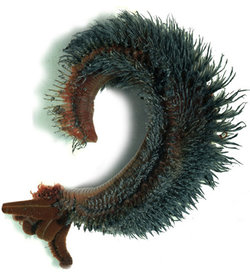Pompeii worm
|
|
| Pompeii worm | ||||||||||||||
|---|---|---|---|---|---|---|---|---|---|---|---|---|---|---|
 | ||||||||||||||
| Scientific classification | ||||||||||||||
| ||||||||||||||
| Binomial name | ||||||||||||||
| Alvinella pompejana |
The Pompeii worm (Alvinella pompejana) is a deep-sea polychaete worm found only at hydrothermal vents in the Pacific Ocean. Discovered in the early 1980s by French researchers, Pompeii worms are most famous for the current belief that they are the "hottest" animals on Earth. They are known as extremophiles.
Pompeii worms get their name from the Roman city of Pompeii that was destroyed during an eruption of Mount Vesuvius in AD 79. Attaching themselves to black smokers, the worms have been found to thrive at temperatures of up to 80°C (176°F), making the Pompeii worm the most heat-tolerant complex animal known to science. They were first discovered at hydrothermal vents off the Galápagos Islands.
The previous champion of heat tolerance was the Sahara desert ant (Cataglyphis bicolor), which can cope with temperatures of up to 55°C (131°F). The Pompeii worm's family name Alvinellidae and genus name Alvinella both derive from DSV Alvin, the three-person submersible vehicle used during the discovery of hydrothermal vents and their fauna during the late 1970s. The family Alvinellidae contains eight other species, but none match the Pompeii worm's heat tolerance.
Reaching a length of up to 13 centimetres (5 inches), Pompeii worms are a pale grey with "hairy" backs; these "hairs" are actually bacteria which are thought to afford the worm some degree of insulation. Glands on the worm's back secrete a mucus which the bacteria feed on (see symbiosis). The Pompeii worms form large aggregate colonies enclosed in delicate, paper-thin tubes.
Pompeii_worm_colony.jpg
Thought to subsist on vent microbes, the Pompeii worm pokes its feather-like head out of its tube home to feed and breathe. The plume of tentacle-like structures on the head are gills, coloured red by haemoglobin. It is the posterior end that is exposed to extreme temperatures; the anterior end stays at a much more comfortable 22°C (72°F).
While it is not yet known precisely how the Pompeii worm survives these hellish vent conditions, scientists suspect the answer lies in the fleece-like bacteria on the worm's back; it may be up to a centimetre thick. The bacteria may possess special proteins, "eurythermal enzymes", providing the bacteria—and by extension the worms—protection from a wide range of temperatures. Studies are hampered by the difficulties of sampling; the Pompeii worms never survive decompression.
Study of the Pompeii worm's seemingly life-sustaining bacteria could lead to significant advances in the biochemical, pharmaceutical, textile, paper and detergent industries.
External links
- Exploratorium: The worm that boasts the world's hottest lifestyle (http://www.exploratorium.edu/aaas-2001/dispatches/thermal_worm.html)
- Mission to the Abyss: includes an interactive 3D rendering of a Pompeii worm (http://www.ocean.udel.edu/extreme2002/creatures/pompeiiworm/)nl:Pompeiiworm
